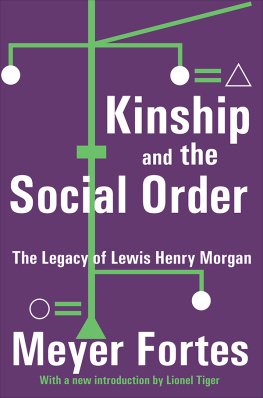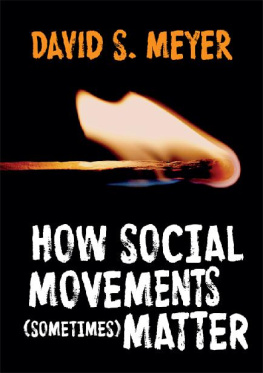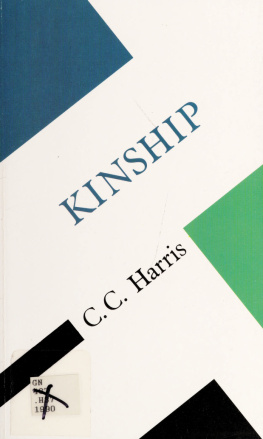Routledge Library Editions
KINSHIP AND THE
SOCIAL ORDER
ANTHROPOLOGY AND ETHNOGRAPHY
Routledge Library Editions
Anthropology and Ethnography
FAMILY & KINSHIP
In 7 Volumes
| I | Three Styles in the Study of Kinship | Barnes |
| II | Kinship and the Social Order | Fortes |
| III | Comparative Studies in Kinship | Goody |
| IV | Elementary Structures Reconsidered | Korn |
| V | Remarks and Inventions | Needham |
| VI | Rethinking Kinship and Marriage | Needham |
| VII | A West Country Village: Ashworthy | Williams |
KINSHIP AND THE
SOCIAL ORDER
The Legacy of
Lewis Henry Morgan
MEYER FORTES
First published in 1969
Reprinted in 2004 by
Routledge
2 Park Square, Milton Park, Abingdon, Oxon, OX14 4RN
Transferred to Digital Printing 2006
Routledge is an imprint of the Taylor & Francis Group
1969 Meyer Fortes
All rights reserved. No part of this book may be reprinted or reproduced or utilized in any form or by any electronic, mechanical, or other means, now known or hereafter invented, including photocopying and recording, or in any information storage or retrieval system, without permission in writing from the publishers.
The publishers have made every effort to contact authors/copyright holders of the works reprinted in Routledge Library Editions Anthropology and Ethnography. This has not been possible in every case, however, and we would welcome correspondence from those individuals/companies we have been unable to trace.
These reprints are taken from original copies of each book. In many cases the condition of these originals is not perfect. The publisher has gone to great lengths to ensure the quality of these reprints, but wishes to point out that certain characteristics of the original copies will, of necessity, be apparent in reprints thereof.
British Library Cataloguing in Publication Data
A CIP catalogue record for this book is available from the British Library
Kinship and the Social Order
ISBN 978-0-415-33009-1
ISBN 978-1-1365-3528-4 (ePub)
Miniset: Family & Kinship
Series: Routledge Library Editions Anthropology and Ethnography
Printed and bound by CPI Antony Rowe, Eastbourne
KINSHIP
AND THE
SOCIAL ORDER
The Legacy of Lewis Henry Morgan
MEYER FORTES
First published 1969 in the United States of America by Aldine Publishing Company
First published in Great Britain 1970 by Routledge & Kegan Paul Ltd
Broadway House, 6874 Carter Lane
London, E.C.4
1969 by Meyer Fortes
No part of this book may be reproduced in any form without permission from the publisher, except for the quotation of brief passages in criticism
ISBN 7100 6794 1
ISBN 978-1-1365-3528-4 (ePub)
LEWIS HENRY MORGAN WAS ASSOCIATED WITH THE UNIVERSITY OF ROCHESTER from its founding. At his death he left it his manuscripts and library, and money to establish a womens college. Save for a wing of the present Womens Residence Halls that is named for him, he remained without a memorial at the University until the Lewis Henry Morgan Lectures were begun.
These Lectures owe their existence to a happy combination of circumstances. In 1961 the Joseph R. and Joseph C. Wilson families made a gift to the University, to be used in part for the Social Sciences. Professor Bernard S. Cohn, at that time Chairman of the Department of Anthropology and Sociology, suggested that establishing the Lectures would constitute a fitting memorial to a great anthropologist and would be an appropriate use for part of this gift. He was supported and assisted by Dean (later Provost) McCrea Hazlett, Dean Arnold Ravin, and Associate Dean R. J. Kaufmann. The details of the Lectures were worked out by Professor Cohn and the members of his Department.
The Morgan Lectures were planned initially as three annual series, for 1963, 1964, and 1965, to be continued if circumstances permitted. It was thought fitting at the outset to have each series focused on a particularly significant aspect of Morgans work. Accordingly, Professor Meyer Fortes 1963 Lectures were on kinship, Professor Fred Eggan devoted his attention to the American Indian, and Professor Robert M. Adams considered a particular facet of the development of civilization, concentrating on urban society. Professor Eggans Lectures and those of Professor Adams were published in 1966. The present volume completes the foundation of the Lewis Henry Morgan Lectures, for although the series have been continued annually and are to be published, the first three years Lectures have a special unity and importance as a whole, particularly in relation to Morgans work.
The visit of Professor Fortes and his wife, Mrs. Doris Fortes, came when the Department at Rochester was just beginning its expansion. The informality favored by these circumstances enabled the Departments faculty to reap the maximum in pleasure and benefits from many unhurried conversations, seminars and evening gatherings, in which all were able to take part at one time or another.
In this greatly expanded version of his original Lectures, Professor Fortes has made it possible for readers who did not hear them or the discussions that went on daily to appreciate more fully (if still imperfectly) his impact on those who did. The Lectures, on which this book is based, were delivered at the University of Rochester on April 2 through April 18, 1963.
ALFRED HARRIS
Department of Anthropology
The University of Rochester
THIS BOOK IS AN EXPANSION OF THE LEWIS HENRY MORGAN LECTURES I WAS privileged to deliver at the University of Rochester in the spring of 1963. In thus enlarging what was originally a short course of lectures, I have had a special aim in view. It seems to me that the controversies among anthropologists of the past two or three generations relating to the subjects I deal with in this book have turned more often on misunderstandings, or even frank disregard, of the relevant source data than on conceptual inadequacies. The picture that has become traditional of Lewis Henry Morgans contributions to our studies is a case in point. My thesis is that the structuralist theory and method of analysis in the study of kinship and social organization developed in modern British and American social anthropology stems directly from Morgans work. This is not a novel point of view, but it has been smothered by the biased interpretations of Morgans ideas and discoveries that have long prevailed. In order, therefore, to establish my thesis, I felt it to be essential to exhibit the evidence in full.













